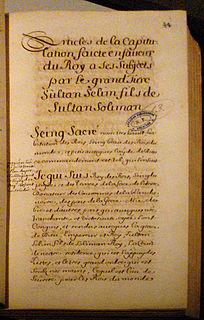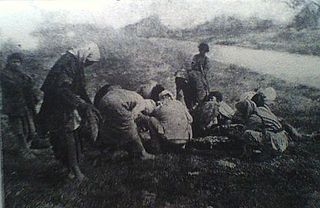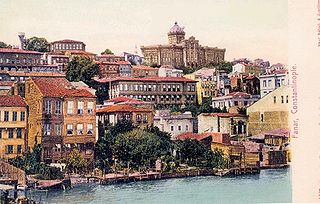 W
WUnder the Ottoman Empire's millet system, Christians and Jews were considered dhimmi under Ottoman law in exchange for loyalty to the state and payment of the jizya tax.
 W
WThe Ahdname of Milodraž, also called the Ahdname of Fojnica, was the ahdname issued on 28 May 1463 by the Ottoman sultan Mehmed the Conqueror to Bosnian Franciscans, represented by Anđeo Zvizdović.
 W
WThe Armenian Patriarch of Constantinople, also known as Armenian Patriarch of Istanbul, is today head of the Armenian Patriarchate of Constantinople, one of the smallest Patriarchates of the Oriental Orthodox Churches but one that has exerted a very significant political role and today still exercises a spiritual authority.
 W
WArmenians in the Ottoman Empire mostly belonged to either the Armenian Apostolic Church or the Armenian Catholic Church. They were part of the Armenian millet until the Tanzimat reforms in the nineteenth century equalized all Ottoman citizens before the law.
 W
WThe Bulgarian Exarchate was the official name of the Bulgarian Orthodox Church before its autocephaly was recognized by the Ecumenical See in 1945 and the Bulgarian Patriarchate was restored in 1953.
 W
WBulgarian Millet or Bulgar Millet was an ethno-religious and linguistic community within the Ottoman Empire from the mid-19th to early 20th century. The semi-official term Bulgarian millet, was used by the Sultan for the first time in 1847, and was his tacit consent to a more ethno-linguistic definition of the Bulgarians as a nation. Officially as a separate Millet in 1860 were recognized the Bulgarian Uniates, and then in 1870 the Bulgarian Orthodox Christians. At that time the classical Ottoman Millet-system began to degrade with the continuous identification of the religious creed with ethnic identity and the term millet was used as a synonym of nation. In this way, in the struggle for recognition of a separate Church, the modern Bulgarian nation was created. The establishment of the Bulgarian Exarchate in 1870, meant in practice official recognition of a separate Bulgarian nationality, and in this case the religious affiliation became a consequence of national allegiance. The founding of an independent church, along with the revival of Bulgarian language and education, were the crucial factors that strengthened the national consciousness and revolutionary struggle, that led to the creation of an independent nation-state in 1878.
 W
WCapitulations of the Ottoman Empire were contracts between the Ottoman Empire and European powers, particularly France. Turkish capitulations, or Ahidnâmes were generally bilateral acts whereby definite arrangements were entered into by each contracting party towards the other, not mere concessions.
 W
WThe Deir ez-Zor Camps were concentration camps in the heart of the Syrian desert in which many thousands of Armenian refugees were forced into death marches during the Armenian Genocide. The United States vice-consul in Aleppo, Jesse B. Jackson, estimated that Armenian refugees, as far east as Deir ez-Zor and south of Damascus, numbered 150,000, all of whom were virtually destitute.
 W
WIn AD 1453, the city of Constantinople, the capital and last stronghold of the Byzantine Empire, fell to the Ottoman Empire. By this time Egypt had been under Muslim control for some seven centuries. Jerusalem had been conquered by the Umayyad Muslims in 638, won back by Rome in 1099 under the First Crusade and then reconquered by Saladin's forces during the Siege of Jerusalem in 1187. Later in the sevenths Crusade, it was taken back by the Catholics once again. It was conquered by the Ottomans in 1517. Orthodoxy, however, was very strong in Russia which had recently acquired an autocephalous status; and thus Moscow called itself the Third Rome, as the cultural heir of Constantinople. Under Ottoman rule, the Greek Orthodox Church acquired power as an autonomous millet. The ecumenical patriarch was the religious and administrative ruler of the entire "Greek Orthodox nation", which encompassed all the Eastern Orthodox subjects of the Empire.
 W
WGiaour or Gawur meaning "infidel", a slur, historically used in the Ottoman Empire for non-Muslims or more particularly Christians in the Balkans.
 W
WPhanariots, Phanariotes, or Fanariots were members of prominent Greek families in Phanar, the chief Greek quarter of Constantinople where the Ecumenical Patriarchate is located, who traditionally occupied four important positions in the Ottoman Empire: Voivode of Moldavia, Voivode of Wallachia, Grand Dragoman, and Grand Dragoman of the Fleet. Despite their cosmopolitanism and often-Western education, the Phanariots were aware of their Hellenism; according to Nicholas Mavrocordatos' Philotheou Parerga, "We are a race completely Hellenic".
 W
WRūm millet, or "Roman nation", was the name of the Eastern Orthodox Christian community in the Ottoman Empire. Despite being subordinated within the Ottoman political system, the community maintained a certain internal autonomy.
 W
WThe Tehcir Law, or, officially by the Republic of Turkey, the "Sevk ve İskân Kanunu" was a law passed by the Ottoman Council of Ministers on May 27, 1915 authorizing the deportation of the Ottoman Empire's Armenian population. The resettlement campaign resulted in the deaths of anywhere between 800,000 and over 1,500,000 civilians in what is commonly referred to as the Armenian Genocide. The bill was officially enacted on June 1, 1915 and expired on February 8, 1916.